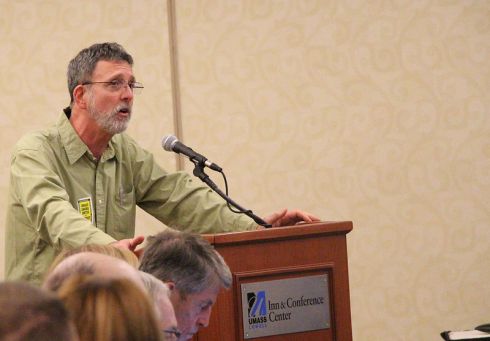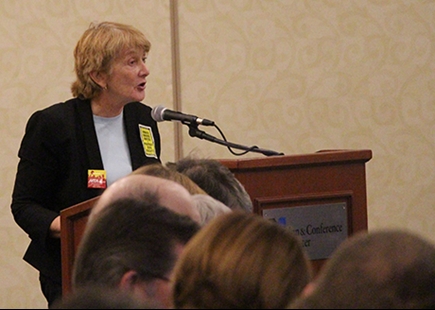UMB Union Reps Speak Out Against Proposed Take-Backs at BOT Meeting
On Wednesday, September 17th, a delegation of union members from across the UMass campuses attended the Board of Trustees meeting at UMass Lowell to protest the give-backs at bargaining. We were asking that the Trustees tell the President and universities to “take back the take-backs.” For the FSU, this means limiting sick leave accrual to 120 days.
Representing the unions were Marlene Kim, our FSU President; Tom Goodkind, PSU Boston President; Donna Johnson, President of the UMass Amherst University Staff Association and Anais Surkin from the Graduate Employees Organization in Amherst. Joining the campus representatives as the fifth speaker was MTA President, Barbara Madeloni. You can read the full remarks of Marlene Kim, Tom Goodkind, and Barbara Madeloni at the end of this email.
Janelle Quarles, CSU Boston President, presented the petitions protesting these give-backs with over 2500 signatures, gathered on the UMass Boston and Amherst campuses and from our community and labor allies, to President Caret and the Trustees.
Read coverage of the meeting in the Lowell Sun here.
See the MTA’s report of the Trustee meeting here.
If you have not yet signed the petition protesting these give-backs, please do so here.
WHAT YOU CAN DO
Show the administration that we are united in fighting against their attacks on our contractual rights and benefits by putting up these signs on your office door. Get them from the union office (2nd floor of Quinn at the end of the catwalk), or email us at fsu@umb.edu and we will deliver signs to you.
Want to have someone speak in your class about the give-backs? Contact the FSU.
BARGAINING UPDATE ON TUESDAY, SEPTEMBER 30, 12-1 PM, Campus Center, 3rd floor, room 3540
Come hear about bargaining from members of your FSU team.
PSU and CSU UNION MEETING ON MONDAY, SEPTEMBER 29th
12:00 Noon Ballroom C, 3rd floor Campus Center
There will be updates from our sister unions on their negotiations and givebacks, plus a discussion of what we can do together in the fight to protect our rights and get a fair contract. (There will also be pizza!) FSU members are invited.
REMARKS FROM BOARD OF TRUSTEES MEETING
Marlene Kim, President, FSU
Let me tell you what this means.
Jeremiah Cotton worked for close to 30 years for UMass Boston as a Professor in Economics. He taught with an oxygen tank tethered to him towards the end of his life, he was that dedicated. If this policy was in effect and his sick leave was limited, he would not have been covered at the end of his life.
Janet Farrell-Smith, a Philosophy Professor, also worked for the university for many years. She had cancer. She would not have been covered by the sick leave benefits either with the new restrictions.
Alice Trost in Economics had brain cancer. She would not have been covered either.
Alice’s parents have given money to our department every year for fifteen years. In part, this is out of gratitude to the university for treating her humanely at the end of her life. The sick leave benefits were crucial to this humane treatment.
In this way, treating workers well pays off.
I am an Economics Professor. One of my specialties is compensation. I have taught a graduate course in compensation and have published in this field. The research shows that if you treat people well, they will perform well in their job. If you don’t treat people well, they will become demoralized, their productivity suffers, and their performance declines—and some staff are feeling this way already.
The President’s office issued a statement today saying that the give-backs are “prudent and appropriate and match policies that have been in place for non-unit employees for many years. “ But it is not prudent or appropriate if it makes employees angry and their productivity and performance suffers.
I ask you: Do we want to stoop to the same level as non-union employers in the private sector with lousy benefits and policies? Or do we want to do better, so that people (like Alice Trost’s parents) give to the university year after year out of gratitude?
When personnel administrators in Santa Clara County in California implemented pay equity, they were proud of this. They wrote about it and opened their doors. People like me and other academics went to visit them, talk to them and study this. The professional staff at UMass Boston have a pay equity policy that is a model program. It should not be eliminated simply because no one else does this. It should be kept and shown as a national model.
We are here today to tell you about what is occurring in bargaining. We ask that you tell the President and the universities to take back the take backs. Because we will not settle with them.
TOM GOODKIND, President, PSU Boston
 I’m Tom Goodkind. I’ve been the research machinist for the science departments at UMass Boston since 1985, and I’m the president of the Professional Staff Union. Among the 1800 professional staff at Amherst and Boston are admissions counselors, advisors, academic support professionals, mental health counselors, nurses, residence directors, fund-raisers, IT experts and many other front-line staff without whom the University would grind to a halt.
I’m Tom Goodkind. I’ve been the research machinist for the science departments at UMass Boston since 1985, and I’m the president of the Professional Staff Union. Among the 1800 professional staff at Amherst and Boston are admissions counselors, advisors, academic support professionals, mental health counselors, nurses, residence directors, fund-raisers, IT experts and many other front-line staff without whom the University would grind to a halt.I’ve been around long enough to have come before you a few times, but I try to do so only when it’s urgent. I understand the desire to roll your eyes and let the rhetoric blow by, but I urge you to pay attention. Today eight unions representing faculty, classified staff, professional staff and graduate employees are delivering petitions with over 2,500 signatures. You are our employer, we are your employees, a bond is breaking, and we are sounding an alarm.
President Caret recently characterized our increase in funding as a “transformational moment” for the University. Yet as our members lobbied and worked for those increased funds, none of us dreamed this would become a transformational moment for labor relations as well. It never occurred to us that as state funding was finally reversing course, as our campuses were surging with enrollments and energy, and as the efforts and workloads of a shorthanded staff were surging accordingly, the University would choose this very moment to launch an unprecedented attack on our benefits and working conditions.
Even more surprising have been the justifications for this offensive. We are told repeatedly that we do not deserve these long-held benefits, because non-union employees do not enjoy them. We are told that it is desirable to “standardize” benefits, but to standardize down rather than up.
I suspect that many of you have applauded speakers such as Senator Warren and Governor Patrick when they have decried the national race to the bottom, called for shoring up working class income and benefits, and even cited the crucial role of unions in reversing the rising tide of inequality. But now this race to the bottom is being run in your own house, in your own family, and we can only wonder at how you treat your family members—those dedicated staff who have already given so much to UMass. And we wonder how you will recruit and retain competent and dedicated staff in the future.
The race to the bottom is no different here at UMass than elsewhere in the country: it leads not to enthusiasm and innovation but to demoralization and decay. And so long as you, our employer, insist on reducing our benefits and devaluing our worth, there can be no common cause in seeking funding and no common cause in celebrating anniversaries or transformational moments. There can only be conflict. The choice is yours.
BARBARA MADELONI, President, Massachusetts Teachers Association
 Good morning and thank you for this opportunity to speak to you.
Good morning and thank you for this opportunity to speak to you. I am Barbara Madeloni, president of the Massachusetts Teachers Association. I am here today to draw your attention to positions taken by the UMass administration in contract negotiations with faculty and staff that the MTA believes to be egregious and unfair.
And I am here to ask that you, as the stewards of our university system, use your considerable influence to see that these stands are changed so that we can find a smooth path to agreements that are fair to everyone on our campuses. Indeed, only if that happens will all of us truly be serving the interests of the thousands of students who depend on us to provide a first-rate education.
Our public university system is one of the finest in the country. I know that firsthand because I am both a product of UMass Amherst and a proud UMass Amherst faculty member.
I have had the honor of working with faculty colleagues whose commitment to students and to advancing knowledge in their fields is unmatched. Moreover, as both a student and a faculty member, I have benefited time and again from the hard work and commitment of the staff who maintain our physical plant, oversee our residence halls and schedule our courses.
Working together, our dedicated faculty and staff accomplish the hundreds of essential things that create the possibilities for students to live and learn in vibrant, supportive communities.
The legislative victory of the fifty-fifty plan to help with student access is an indication of the state’s ongoing commitment to public higher education. I appreciate and applaud that commitment. But I also know that the success of the initiative is due in no small part to the efforts of faculty and staff, working with the administration, to secure the funding we need to grow and maintain our university system.
From across the state, campus employees in every position organized to move the plan forward, just as they have always been eager allies of the administration in fighting for adequate funding – and for every other step required to ensure that UMass is an institution in which collaboration and inquiry serve as a foundation for students to grow and succeed.
So it leaves me confused when I learn that administrators within the university are aggressively demanding givebacks from the very people who build and hold together our university system – many of whom are our lowest-paid workers.
I am stunned that administrators could fail to understand that the strength of this institution we all love so much rests on the working people who – in each task, in each interaction with students and colleagues – knit together the community that allows for learning and engagement.
I am also outraged.
I cannot fathom how anyone could not comprehend that support, economic security and respect for all employees are essential to the health of our university.
Campus unions are continuing to negotiate in good faith, but we can no longer stomach punitive, regressive and counterproductive demands. I urge you in the strongest possible terms, as leaders of the system, to call on UMass administrators to immediately retract their aggressive giveback proposals and come to the table and the community with appropriate offers.
All of us deserve proposals acknowledging that the strength of our university system rests on unions and the administration working together, as we have done in the past, in relationships of mutual trust and respect. And we will stand together until such proposals form the basis of our discussions, allowing us to jointly seek what is best for our students and our campuses.
Thank you for your time.
